人教版高中英语必修四高一下英语测试题一
{人教版}高中英语必修四 Unit5 Theme parks 训练卷(一) (带答案)
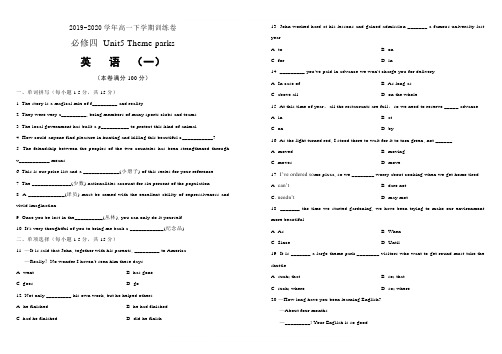
2019-2020学年高一下学期训练卷必修四Unit5 Theme parks英语(一)(本卷满分100分)一、单词拼写(每小题1.5分,共15分)1. The story is a magical mix of f_________ and reality.2. They were very a_________, being members of many sports clubs and teams.3. The local government has built a p__________ to protect this kind of animal.4. How could anyone find pleasure in hunting and killing this beautiful c___________?5. The friendship between the peoples of the two countries has been strengthened through v___________ means.6. This is our price list and a _____________(小册子) of this series for your reference.7. The ______________(少数) nationalities account for six percent of the population.8. A _____________(译员) must be armed with the excellent ability of expressiveness and vivid imagination.9. Once you be lost in the__________(丛林), you can only do it yourself.10. It's very thoughtful of you to bring me back a ____________(纪念品).二、单项选择(每小题1.5分,共15分)11. —It is said that John, together with his parents, _________ to America.—Really?No wonder I haven't seen him these days.A. wentB. has goneC. goesD. go12. Not only _________ his own work, but he helped others.A. he finishedB. he had finishedC. had he finishedD. did he finish 13. John worked hard at his lessons and gained admission _______ a famous university last year.A. toB. onC. forD. in14. _________ you've paid in advance we won't charge you for delivery.A. In case ofB. As long asC. above allD. on the whole15. At this time of year,all the restaurants are full,so we need to reserve _____ advance.A. inB. atC. onD. by16. As the light turned red, I stood there to wait for it to turn green, not ______.A. movedB. movingC. movesD. move17. I’ve ordered so me pizza, so we ________ worry about cooking when we get home tired.A. can’tB. dare notC. needn’tD. may mot18. _______ the time we started gardening, we have been trying to make our environment more beautiful.A. AsB. WhenC. SinceD. Until19. It is _______ a large theme park ________ visitors who want to get round must take the shuttle.A. such; thatB. so; thatC. such; whereD. so; where20.—How long have you been learning English?—About four months.—_________! Your English is so good.A. I’m stuckB. You got meC. I couldn’t agre e moreD. You can’t be serious三、翻译句子(每小题3分,共15分)21. The shop sells a variety of dresses at different prices._________________________________________________________________22. Cancer is second only to heart disease as a cause of death._________________________________________________________________23. The aim of education is to teach young people to think for themselves and not follow others blindly._________________________________________________________________24. 我们菜园阳光充足,所以蔬菜都长得很好。
人教版高中英语必修四(下)高一英语期末测试题

高中英语学习材料madeofjingetieji(下)高一英语期末测试题注意事项:1. 答题前, 考生先将自己的姓名、考号填写清楚, 将条形码准确粘贴在条形码区域内。
2. 选择题必须使用2B铅笔填涂;非选择题必须使用0.5毫米黑色字迹的签字笔书写,字迹工整,笔迹清楚。
3. 请按照题号顺序在各题目的答题区域内作答,超出答题区域书写的答案无效;在草稿纸、试题卷上答题无效。
4. 保持卡面清洁,不要折叠,不要弄破、弄皱,不准使用涂改液、修正带、刮纸刀。
第一部分听力(共两节,满分30分)第一节(共5小题;每小题1.5分.满分7.5分)听下面5段对话。
每段对话后有一个小题.从题中所给的A,B,C三个选项中选出最佳选项,并标在试卷的相应位置。
听完每段对话后。
你都有10秒钟的时间来回答有关小题和阅读下一小题。
每段对话仅读一遍。
1. Why doesn’t the man want to go hiking?A. He is in pain.B. He dislikes hiking.C. He has to pass an exam.2. How old is the man probably?A. He’s a teenager.B. He’s in his 30s.C. He’s in his late 40s.3. What will the man probably do next?A. Buy something.B. Look for the key.C. Wait for the woman.4. What can we learn from the conversation?A. The woman is helpful.B. Mr. Green is unhappy.C. Mr. Barkley is disappointed.5. What are the speakers mainly talking about?A. Apartment rents.B. Online shopping.C. Cell phone bills. 第二节(共15小题;每小题1.5分,满分22.5分)听下面5段对话或独白。
人教版本高中英语必修四高中高一下学期期末考试英语
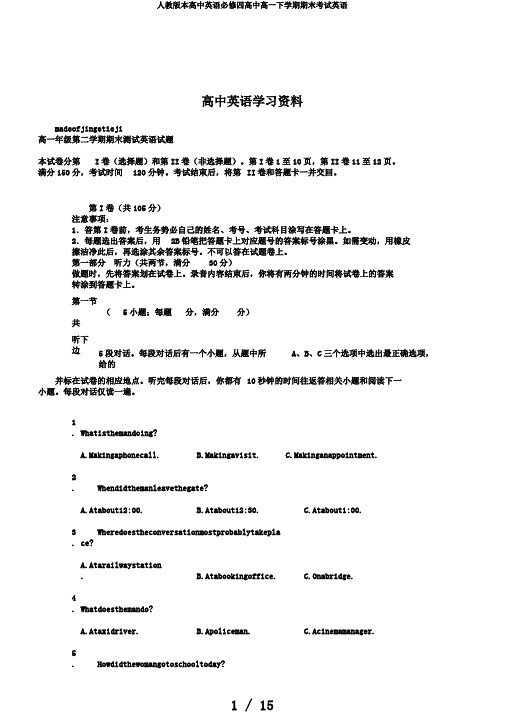
高中英语学习资料madeofjingetieji高一年级第二学期期末测试英语试题本试卷分第I卷(选择题)和第II卷(非选择题)。
第I卷1至10页,第II卷11至12页。
满分150分,考试时间120分钟。
考试结束后,将第II卷和答题卡一并交回。
第I卷(共105分)注意事项:1.答第I卷前,考生务势必自己的姓名、考号、考试科目涂写在答题卡上。
2.每题选出答案后,用2B铅笔把答题卡上对应题号的答案标号涂黑。
如需变动,用橡皮擦洁净此后,再选涂其余答案标号。
不可以答在试题卷上。
第一部分听力(共两节,满分30分)做题时,先将答案划在试卷上。
录音内容结束后,你将有两分钟的时间将试卷上的答案转涂到答题卡上。
第一节(共5小题;每题分,满分分)听下边5段对话。
每段对话后有一个小题,从题中所给的A、B、C三个选项中选出最正确选项,并标在试卷的相应地点。
听完每段对话后,你都有10秒钟的时间往返答相关小题和阅读下一小题。
每段对话仅读一遍。
1.Whatisthemandoing?A.Makingaphonecall.B.Makingavisit.C.Makinganappointment.2.Whendidthemanleavethegate?A.Atabout12:00.B.Atabout12:30.C.Atabout1:00.3 .Wheredoestheconversationmostprobablytakeplace?A.Atarailwaystation. B.Atabookingoffice. C.Onabridge.4.Whatdoesthemando?A.Ataxidriver.B.Apoliceman.C.Acinemamanager.5.Howdidthewomangotoschooltoday?A.Bybike.B.Bybus.C.Onfoot.第二节(共15小题;每题分,满分分)听下边5段对话或独白。
2019~2020学年人教版高中英语 必修4 Unit4 Body language 训练卷(一)
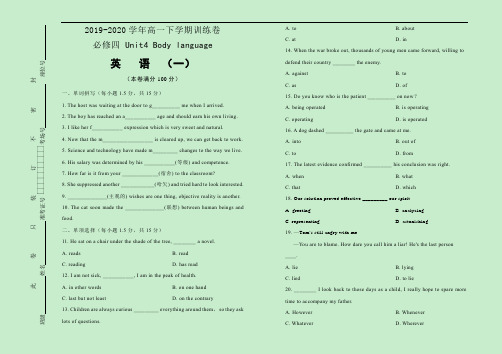
2019-2020学年高一下学期训练卷 必修四 Unit4 Body language英 语 (一)(本卷满分100分)一、单词拼写(每小题1.5分,共15分)1. The host was waiting at the door to g__________ me when I arrived.2. The boy has reached an a___________ age and should earn his own living.3. I like her f___________ expression which is very sweet and natural.4. Now that the m__________________ is cleared up, we can get back to work.5. Science and technology have made m_________ changes to the way we live.6. His salary was determined by his ___________(等级) and competence.7. How far is it from your _____________(宿舍) to the classroom?8. She suppressed another ____________(哈欠) and tried hard to look interested. 9. ______________(主观的) wishes are one thing, objective reality is another. 10. The cat soon made the ______________(联想) between human beings and food.二、单项选择(每小题1.5分,共15分)11. He sat on a chair under the shade of the tree, ________ a novel. A. reads B. read C. readingD. has read12. I am not sick, ___________, I am in the peak of health. A. in other words B. on one hand C. last but not leastD. on the contrary13. Children are always curious _________ everything around them ,so they ask lots of questions.A. toB. aboutC. atD. in14. When the war broke out, thousands of young men came forward, willing to defend their country ________ the enemy. A. againstB. toC. asD. of15. Do you know who is the patient __________ on now ? A. being operated B. is operating C. operatingD. is operated16. A dog dashed __________ the gate and came at me. A. into B. out of C. toD. from17. The latest evidence confirmed __________ his conclusion was right. A. when B. whatC. thatD. which18. Our solution proved effective _________ our spirit. A. greeting B. analyzing C. representingD. astonishing19. —Tom's still angry with me.—You are to blame. How dare you call him a liar! He's the last person ____. A. lie B. lying C. liedD. to lie20. ________ I look back to those days as a child, I really hope to spare more time to accompany my father. A. However B. Whenever C. WhateverD. Wherever此卷只装订不密封班级 姓名 准考证号 考场号 座位号三、翻译句子(每小题3分,共15分)21. On graduating from university, he went to teach in a village._________________________________________________________________ 22. This job,if done according to the instructions, will be finished ahead of time._________________________________________________________________ 23. Not having heard from her son tor a long time, the mother worried a great deal._________________________________________________________________ 24. 老师进来了,身后跟着一些学生。
人教版高中英语必修四下学期期末联考高一英语试题
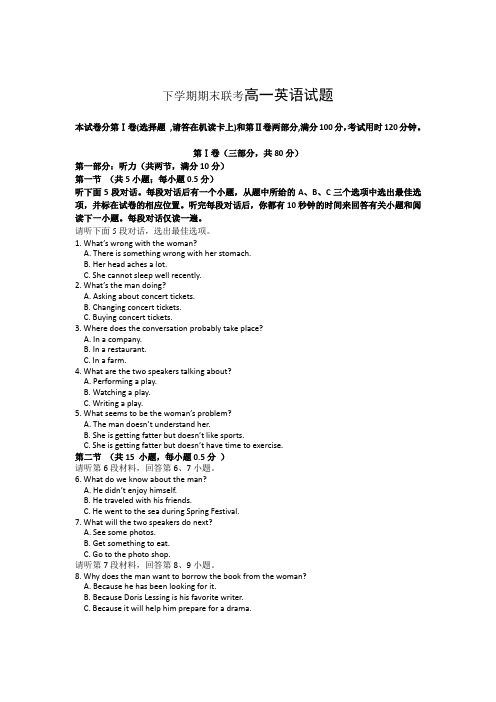
下学期期末联考高一英语试题本试卷分第Ⅰ卷(选择题,请答在机读卡上)和第Ⅱ卷两部分,满分100分,考试用时120分钟。
第Ⅰ卷(三部分,共80分)第一部分:听力(共两节,满分10分)第一节(共5小题;每小题0.5分)听下面5段对话。
每段对话后有一个小题,从题中所给的A、B、C三个选项中选出最佳选项,并标在试卷的相应位置。
听完每段对话后,你都有10秒钟的时间来回答有关小题和阅读下一小题。
每段对话仅读一遍。
请听下面5段对话,选出最佳选项。
1. What’s wrong with the woman?A. There is something wrong with her stomach.B. Her head aches a lot.C. She cannot sleep well recently.2. What’s the man doing?A. Asking about concert tickets.B. Changing concert tickets.C. Buying concert tickets.3. Where does the conversation probably take place?A. In a company.B. In a restaurant.C. In a farm.4. What are the two speakers talking about?A. Performing a play.B. Watching a play.C. Writing a play.5. What seems to be the woman’s problem?A. The man doesn’t understand her.B. She is getting fatter but doesn’t like sports.C. She is getting fatter but doesn’t have time to exercise.第二节(共15 小题,每小题0.5分)请听第6段材料,回答第6、7小题。
新人教版高一英语必修4下学期期末考试(附答案)
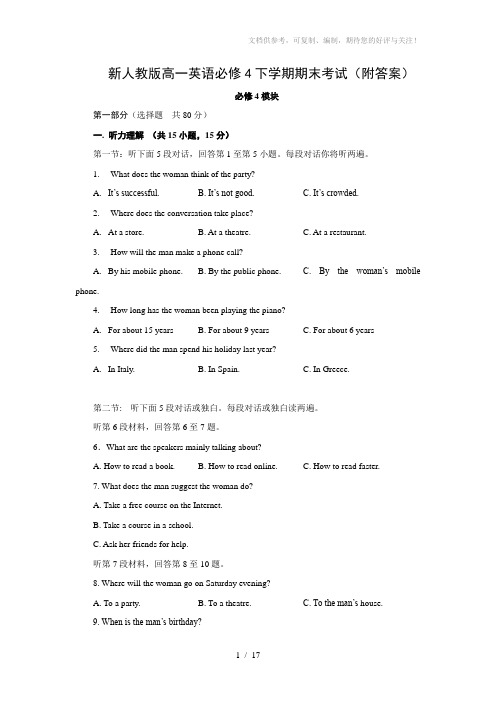
新人教版高一英语必修4下学期期末考试(附答案)必修4模块第一部分(选择题共80分)一. 听力理解(共15小题,15分)第一节:听下面5段对话,回答第1至第5小题。
每段对话你将听两遍。
1.What does the woman think of the party?A.It’s successful.B. It’s not good.C. It’s crowded.2.Where does the conversation take place?A.At a store.B. At a theatre.C. At a restaurant.3.How will the man make a phone call?A.By his mobile phone.B. By the public phone.C. By the woman’s mobile phone.4.How long has the woman been playing the piano?A.For about 15 yearsB. For about 9 yearsC. For about 6 years5.Where did the man spend his holiday last year?A.In Italy.B. In Spain.C. In Greece.第二节: 听下面5段对话或独白。
每段对话或独白读两遍。
听第6段材料,回答第6至7题。
6.What are the speakers mainly talking about?A. How to read a book.B. How to read online.C. How to read faster.7. What does the man suggest the woman do?A. Take a free course on the Internet.B. Take a course in a school.C. Ask her friends for help.听第7段材料,回答第8至10题。
(2021年整理)高一英语必修4测试题

(完整)高一英语必修4测试题编辑整理:尊敬的读者朋友们:这里是精品文档编辑中心,本文档内容是由我和我的同事精心编辑整理后发布的,发布之前我们对文中内容进行仔细校对,但是难免会有疏漏的地方,但是任然希望((完整)高一英语必修4测试题)的内容能够给您的工作和学习带来便利。
同时也真诚的希望收到您的建议和反馈,这将是我们进步的源泉,前进的动力。
本文可编辑可修改,如果觉得对您有帮助请收藏以便随时查阅,最后祝您生活愉快业绩进步,以下为(完整)高一英语必修4测试题的全部内容。
高一英语必修4测试题(共两部分满分150)第一部分(共100分)斗鸡中学高一年级白云梅I。
单词辨音(5 marks)()1。
A。
happy B。
family C。
what D can()2。
A. job B. comic C。
doctor D. walkman( )3. A。
locker B。
hers C。
others D .secondary( )4 A. look B good C too D book( )5 A. their B there C where D hereⅡ Choose the best answer.(15 marks)6。
We will do everything we can _____ out city and people.A. to saveB. save C。
save to D. saving7。
Every girl and every boy _____ the right to join the club.A. have B。
has C。
will has D。
there is8 Neither Tom nor Jack and I ______his students, but each of us _____ gone to the hospital to see him.A。
人教新课标高一下期Book4Unit1单元测试题
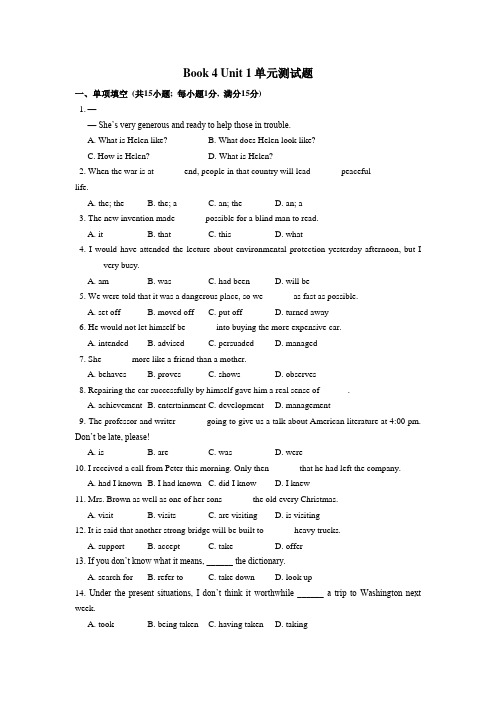
Book 4 Unit 1单元测试题一、单项填空(共15小题; 每小题1分, 满分15分)1. — ______—She’s very generous and ready to help those in trouble.A. What is Helen like?B. What does Helen look like?C. How is Helen?D. What is Helen?2. When the war is at ______ end, people in that country will lead ______ peacefullife.A. the; theB. the; aC. an; theD. an; a3. The new invention made ______ possible for a blind man to read.A. itB. thatC. thisD. what4. I would have attended the lecture about environmental protection yesterday afternoon, but I ______ very busy.A. amB. wasC. had beenD. will be5. We were told that it was a dangerous place, so we ______ as fast as possible.A. set offB. moved offC. put offD. turned away6. He would not let himself be ______ into buying the more expensive car.A. intendedB. advisedC. persuadedD. managed7. She ______ more like a friend than a mother.A. behavesB. provesC. showsD. observes8. Repairing the car successfully by himself gave him a real sense of ______.A. achievementB. entertainmentC. developmentD. management9. The professor and writer ______ going to give us a talk about American literature at 4:00 pm. Don’t be late, please!A. isB. areC. wasD. were10. I received a call from Peter this morning. Only then ______ that he had left the company.A. had I knownB. I had knownC. did I knowD. I knew11. Mrs. Brown as well as one of her sons ______ the old every Christmas.A. visitB. visitsC. are visitingD. is visiting12. It is said that another strong bridge will be built to ______ heavy trucks.A. supportB. acceptC. takeD. offer13. If you don’t know what it means, ______ the dictionary.A. search forB. refer toC. take downD. look up14. Under the present situations, I don’t think it worthwhile ______ a trip to Washington next week.A. tookB. being takenC. having takenD. taking15. — What do you intend to do after graduation?—______ my father’s work as a doctor.A. Cheer upB. Bring upC. Carry onD. Hold on二、完形填空(共20小题; 每小题1.5 分, 满分30分)My husband John likes to be with old people. He has 16 several elderly friends in the past.Mr. Daves fished the same lake as John for over 15 years. A(n) 17 developed but when Mrs. Daves died five years ago, it left Mr. Daves 18 . They had no children and after sixty years of marriage he felt 19 . So John took Mr. Daves 20 with him every time he went. Mr. Daves was never 21 being with John.A few years later, Mr. Daves had a stroke. He lost his speech and was put into a nursing home. Confined(限制) to his bed and unable to 22 , Mr. Daves began to suffer from depression. This almost 23 John’s heart.He finally got 24 from the nursing home to take Mr. Daves out for a ride. They were both 25 to be together again but it was very painf ul for Mr. Daves to be lifted into John’s car.26 he was paralyzed (瘫痪) on one side, the 27 of that side pulled heavily on his good side. John 28 about this but still took him out about every ten days.John had gotten his car a year earlier and it was his 29 car. He liked it very much, but one day he announced he was 30 it so he could buy a van(客货车) that could hold a wheelchair (轮椅). He did sell his car and buy a van. It wasn’t fast but it eased (减轻) Mr. Daves’ 31 on their outings and they both 32 themselves so much more. Mr. Daves is getting old now at 86 but still enjoying life 33 John.I hope others can follow John’s 34 and take similar steps to help those who are35 .16. A. helped B. invited C. accepted D. found17. A. interest B. secret C. friendship D. agreement18. A. common B. alone C. free D. quiet19. A. angry B. afraid C. shameful D. hopeless20. A. running B. fishing C. working D. playing21. A. tired of B. fond of C. good at D. nervous about22. A. smile B. write C. study D. communicate23. A. broke B. shook C. killed D. won24. A. messages B. information C. permission D. expectation25. A. proud B. excited C. surprised D. frightened26. A. Because B. If C. While D. Until27. A. shape B. position C. strength D. weight28. A. asked B. searched C. worried D. complained29. A. dream B. sports C. used D. private30. A. watching B. selling C. repairing D. decorating31. A. doubt B. pain C. shame D. sadness32. A. forgot B. hated C. enjoyed D. missed33. A. as to B. but for C. except for D. thanks to34. A. condition B. reason C. example D. record35. A. in addition B. in danger C. in peace D. in need三、阅读理解(共两节, 满分40分)第一节(共15小题; 每小题2分, 满分30分)ASoccer—Spring 2012Get in the game! Youth Soccer is a pleasure!This is a club designed for 4 to 12-year-old children. They can learn to develop and use their basic soccer skills. All teams will be coached by parents or volunteers. Team T-shirts will be provided.Registration(登记) begins on Saturday, December 3 from 8:30 to 11:30 a.m. for ACC residents (居民). Non-country residents may register on Wednesday, December 7 from 8:30 a.m. to 4:30 p.m. at Bishop Park.• Ages: 4-12• Program date: February 27–April 28• Practice days:Under 6: Monday, 5:30 – 6:30 p.m. (No practice March 10)Under 8: Monday, 6:00 – 7:00 p.m. (No practice March 12)Under 10: Tuesday, 5:30 – 6:30 p.m. (No practice March 13)Under 13: Tuesday, 6:00 – 7:00 p.m. (No practice March 14)Game days: Saturdays (No games March 17)• Game t imes: 9:30 a.m. Practice and game rainouts played on Thursdays.• Fee: $65 for ACC residents. $98 for nonresidents.Please call 706-613-3589 for more information.Become a volunteer coach. Print out Volunteer Coaches Background Check Packet.36. What do we know about the soccer game in spring?A. Parents should volunteer for service.B. Teams are divided by registration order.C. Players should buy T-shirts of the team.D. There are no professional coaches.37. If the practice and games are stopped by rain, the matches will be played ______.A. on ThursdaysB. on MondaysC. on TuesdaysD. on Wednesdays38. If you are 12 years old, you should go to practice at ______.A. 5:30-6:30 p.m.B. 6:00-7:00 p.m.C. 8:30-11:30 p.m.D. 2:30-4:30 p.m.BNow, an eight-year-old has just got himself into the Guinness Book of Records as the world’s youngest founder and Chief Executive Officer (CEO) of an Internet company.Harli Jordean became famous at the age of six when he discovered marbles (玻璃球). He became so interested in them that his mother called him Marble King. He would sleep with them and even take them to school.When some older kids took away his whole collection, the young boy begged his mother to get him another group of marbles. However, when Tina Jordean tried to order some more on the Internet, she was surprised to find that there wasn’t a place to buy marbles.That’s when the six-year-old’s business spirit appeared and he persuaded his mother to set up a website that sold beautiful marbles. Thinking it may be a good way for him to learn about money, his mother agreed and was born!To her surprise, orders started coming in and the rest as they say, is history. Today, the young business person, who lives in Stoke Newington, London, is so busy completing orders that he has invited his mother and two brothers to help out.And, he is not done yet. The young boy, who dreams of having the world’s largest marble shop, is now trying to encourage his mother to make custom-branded marbles with the Marble King logo. We have a feeling that like all his other ideas, this one will be a big success. We just wonder what this bright businessman will do when he grows up!39. Why was Harli called Marble King?A. Because he liked marbles very much.B. Because he had many colorful marbles.C. Because he was good at making marbles.D. Because he could easily tell the marbles’ names.40. Harli’s mother set up a website to sell marbles because ______.A. she found it fun to collect marblesB. she expected Harli to learn how to make moneyC. she hoped to teach Harli how to be a CEOD. she noticed Harli had a talent for business41. From the fifth paragraph, we can infer that ______.A. Harli failed his lessons for doing businessB. Harli did the business all by himselfC. Harli’s business went very wellD. Harli sold his marbles at lower prices42. What’s the main idea of the passage?A. How to set up a website in simple steps.B. Harli wished to be a CEO of a company.C. An 8-year-old boy had a marble shop.D. The world’s youngest CEO is 8 years old.CBefore the million-copy sales of The Joy Luck Club, The Kitchen God’s Wife and The Hundred Secret Senses, Amy Tan was a writer. A business writer. She and a partner ran a technical-writing business with lawyer-like ―billable hours (小时计费) .‖Her role with customers was largely that of account management (账户管理), but she wanted to do something more creative with words, English words.So she told her partner, ―I want to do more writing.‖ He declared her strength was doing estimates (估算) and collecting bills. ―It was a terrible thing.‖ The very thing Tan hated and knew she wasn’t really good at. But her partner insisted that writing was her weakest skill.―I can believe him and just keep doing this or make my requests,‖ she argued and stoo d up for her rights.He would not give in.Shocked, Tan said, ―I leave.‖And he said, ―You can’t leave. You’re fired! You’ll never make a dollar from writing.‖Tan set out to prove him wrong, taking on as many jobs as she could. Sometimes she worked 90 hours a week as a freelance (自由的) technical writer. Being on her own was difficult. But not letting others limit her made it worthwhile. And on her own, she felt free to try fiction. And so The Joy Luck Club, featuring the bright, lonely daughter of Chinese immigrants, was born. And the manager who couldn’t write became one of America’s bestselling, best-loved authors.43. As a business writer, Tan ______.A. got paid by the hourB. acted as a lawyerC. also sold many booksD. published a million copies44. Why did Tan want to do more writing?A. She didn’t communicate with customers.B. She found it boring to do her work all day.C. She was tired of working with her partner.D. She had no skill in collecting bills.45. We can infer from the last paragraph that ______.A. Tan worked hard to sell her own booksB. Tan described a lonely Chinese girl in her bookC. Tan was regretful to do things all by herselfD. Tan considered it worthwhile to be independent46. Why did the author write the passage?A. To tell us to believe in ourselves.B. To teach us how to run business.C. To tell a story of a Chinese girl.D. To prove the importance of teamwork.DCan you imagine a world without music? Studies show that public schools across the country are reducing music class es to save money. What’s worse, some schools have never had music classes. But without music, students’ academic (学业的) growth and emotional health could suffer. To prevent these, music classes should be necessary for all students in public schools.Recent studies by Brown University have shown that the students who received music education classes did much better in math and reading skills than those without. Another study by The College Board found that students taking music and art classes got higher points than those without having these classes. Students’ success seems to depend on their taking part in music education.Music programs in public schools also help encourage a student’s sense of pride and self-confidence. Teens today have too much learning tasks. Besides, they have family problems, self-confidence problems and relationship troubles. Music education can help. The students who took part in school music programs were less likely to turn to smoking.Music allows students from different countries to communicate. For example, at a school talent show, a new Japanese student played a piano duet (二重奏) with an American classmate. Although they could not communicate in words, they were able to read the music together. Two students from different cultures worked as a team with self-confidence and a common purpose through music.The gift of music is priceless. We need to make sure that we have necessary music classes for all students. The world is losing its music, and putting music into schools is the first step in getting it back.47. It can be inferred from the second paragraph that ______.A. music is as difficult as mathB. music does good to students’ learningC. music needs a higher reading skillD. music makes students suffer emotional problems48. Which of the following is NOT the advantage of music programs?A. Helping students build up self-confidence.B. Reducing the chance of turning to smoking.C. Solving their family problems.D. Helping students perform well on stage.49. The example in the fourth paragraph proves that ______.A. music crosses language, class and cultureB. Japan has a good relationship with AmericaC. different cultures have different styles of musicD. Japanese and American students are good at playing the piano50. What was the author’s attitude towards music education in school?A. He thought it must be painful.B. He felt it wasn’t worth teaching.C. He was strongly against it.D. He was very fond of it.第二节(共5小题; 每小题2分, 满分10分)根据短文内容,从短文后的选项中选出能填入空白处的最佳选项。
- 1、下载文档前请自行甄别文档内容的完整性,平台不提供额外的编辑、内容补充、找答案等附加服务。
- 2、"仅部分预览"的文档,不可在线预览部分如存在完整性等问题,可反馈申请退款(可完整预览的文档不适用该条件!)。
- 3、如文档侵犯您的权益,请联系客服反馈,我们会尽快为您处理(人工客服工作时间:9:00-18:30)。
高中英语学习材料madeofjingetieji武汉市第十四中学高一下学年英语测试题(一)第I卷第一部分:听力(共两节,满分30分)第一节(共5小题;每小题1.5分,满分7.5分)听下面5段对话。
每段对话后有一个小题,从题中所给的A、B、C三个选项中选出最佳选项,并标在试卷的相应位罝。
听完每段对话后,你都有10秒钟的时间来回答有关小题和阅读下一小题。
每段对话仅读一遍。
1.What’s the probable relationship between the two speakers?A.Old classmates.B. Travelers in England.C. Tourist and guide.2.How will the man send the machines?A. By ship.B. By air.C. By truck.3.Where is the man going to plant the tree?A.By the front door.B.At the back of the garage.C.At the other end of the garden.4.What does the man advise Alan to do?A.Go out to work.B. Listen carefully to John.C. Be calm and patient.5.When is the man going home?A. In the evening.B. In the afternoon.C. At noon.第二节(共15小短:每小题1.5分,满分22.5分)听下面5段对话或独白。
每段对话或独白后有几个小题,从题中所给的A、B、C三个选项中选出最佳选项,并标在试卷的相应位置。
听每段对话或独白前,你将有时间阅读各个小题,每小题5秒钟:听完后,各小题将给出5秒钟的作答时间。
每段对话或独白读两遍。
听第6段材料,回答第6. 7题。
6. Why does the man want to eat out?A.He wants to celebrate his birthday.B.He has won a big prize.C.He wants to have some relaxation.7. Where will they have supper?A.At home.B. The place the man likes.C. The place the woman prefers.听第7段材料,回答第8至10题。
8. Why is the man not certain of the job?A. His education is not enough.B. Others are more suitable than him.C. He does not have enough work experience.9. According to the woman, what is important for work?A. The ability to put knowledge to practical use.B. Good knowledge with work experience.C. Strong will and hard work.10. What is the man’s opinion about the interviewers?A. They have good experience.B. They are experts in the field.C. They are knowledgeable but proud.听第8段材料,回答第11至13题。
11. What are the speakers mainly talking about?A. Buying books for their course.B. The money needed for the books.C. Sharing the books with each other.12. Why does Dr. Downs want his students to have these five books?A. These books are not expensive.B. He wants his students to read more.C. He wants to discuss them in detail.13. How does the woman plan to solve the problems about the books?A. She buys three and the man buys two.B. She pays the man fifty dollars for sharing.C. They will share the total amount for the books.听第9段材料,回答第14至16题。
14. What subjects does the woman like to apply for next year?A. Economics.B. Engineering.C. Science.15. What’s the purpose of the woman talking with the man?A. For a good record of her studies this year.B. For a recommendation of him.C. To get some advice about the recommendation.16. What do the woman’s parents think of her idea?A. They think it is a good idea.B. They think it is a bad idea.C. They think it has nothing to do with them.听第10段材料,回答第17至20题。
17. How many people took part in the swimming activity?A. About 300.B. About 3000.C. About 30,000.18. Who organized the swimming activity?A. Local Authority.B. The Tourism Agency.C. The Sports Center.19. Why did they organize the swimming activity?A. To make people more aware of environmental protection.B. To get ready for a swimming competition.C. To celebrate the Dragon-boat Festival.20. What can we know from the 62-year-old swimmer?A. the river isn’t as clean as it was several years ago.B. the river was very clean when he was a child.C. he often goes swimming in the river.第二部分阅读理解(共两节,满分40分)第一节(共15小题;每小题2分,满分30分)AI was a dance teacher when I first began working with people who have disabilities. I had thirty students. These were teens and adults up to the age of 40. We learned new steps together. We laughed together and we shared a love of music and fellowship.I had one pupil, Dan, who didn’t appear to get much out of the class. I never had eye contact with him. When I left the class to travel down the stairs to reach the main floor of the building, he moved worriedly as a blind person might do in unfamiliar condition.One day his parents met me shopping downtown and told me that they were so grateful that I was teaching the class. They said that my class was the high point of their son’s week. Were they just being polite?A week later, a snowstorm held me up and I was later than usual pulling into the school parking lot. Ahead of me by one row of cars, and over to one side, was my student, Dan and his worker. I could see his face as he moved toward the building. He was excited. I watched Dan run toward the building in anticipation of(期待着)his weekly treat, my class. I cried as it hit me that though I could not see in class all that Dan got from the class, it surely meant a lot to him. Dan did indeed love the class. He was getting enjoyment out of it.Today when I teach courses at the College to students, I remind them that children can stand onthe sidelines and seem to be uninterested and yet they can be learning at the same pace as those who are in the middle of the activity. When I teach this, I think, yes and this is true for those with disabilities too!Teach with the wonderful enthusiasm and you are bound to reach your students. Do your job with a love for others and you will be successful no matter what your job involves.21. The writer found her working with disabilities _______.A. boringB. confusingC. satisfyingD. challenging22. The writer has learned from Dan that ______.A. a teacher is sure to reach his studentsB. kids with disabilities need more loveC. students learn in different waysD. a students makes achievements out of a class23. What can we learn from the passage?A. The writer was doubtful when hearing what Dan’s parents said.B. Dan didn’t get much out of the dancing class.C. Dan received more attention in the writer’s class.D. The writer was impatient with Dan at first.24. How can writer reach the students?A. Teach with loveB. Teach with enthusiasmC. Laugh togetherD. Learn new stepsBDennis Sinar, 51, a doctor from New York, is quick to explain why he took a year-long break from his job. “I was pretty burned out after practicing medicine for 26 years. I needed a recharge.”So he took a “gap year”, from July 2011 to June 2012, to explore things like ancient buildings, and traditional Eastern medicine, in locations including Alaska, Nepal and Romania.“Taking a break from work is an excellent way for adults to go into a new career or refresh an old one,”said Holly Bull, president of Princeton, N, J. “In recent years, mid-career breaks have been gaining more interest,”she said. A report on adult gap years published this year by a market research company also described the potential American market for gap years as a “sleeping giant.”“A gap year is a challenge for the older individual to step out of a comfort zone and take a risk.I enjoyed that side most.”said Dr. Sinar, who kept a daily blog about his experience. His time studying Eastern medicine “assured the reasons I went into health care,”said Dr. Sinar, who returned to practice medicine at his old job, although he works fewer days. “I use those experiences to provide my patients with more care,”he added. “And I listen better than I did before.”George Garritan, chairman of the Department of Leadership and Human Capital Management at New York University, certainly agrees with Dr. Sinar. He said a gap-year experience could be worthwhile for employees and companies. For employees, investing in themselves and improving skill sets is a move that will benefit throughout their career. He added that returning employees feel refreshed and have given more thought to their career. For companies, offering unpaid leaves makes good sense for attracting and keeping talented employees.25. Dr. Sinar took a gap year because he ______.A. had lost his old jobB. wanted to refresh after 26 years’workC. had a desire for travellingD. became interested in historical research26. The phrase “sleeping giant”(in 2nd paragraph) indicates that ______.A. it’s too early for people to accept the concept of gap yearB. the effect of gap year policy remains to be seenC. it’s difficult to foresee the gap year marketD. more American people will accept the gap year policy27. What’s George Garritan’s attitude toward the “gap year”?A. Positive.B. DoubtfulC. Uninterested.D. Uncertain.28. What’s the passage mainly about?A. How an adult plans a mid-career gap year.B. Why a gap year is worthwhile for adults.C. Whether a gap year is popular with adults.D. Why a gap year is challenging for individuals.CIf you want to express something so unbelievable that it must have been a special effect, you have a new word to add to your vocabulary.It’s “Duang”, an onomatopoetic (拟声词) word which doesn’t relate to any particular Chinesecharacter and refers to a special effect.A video parody (恶搞) adapted from a shampoo commercial featuring Hong Kong actor Jackie Chan spread quickly online, leading Internet users to invent the new word.The video begins with Chan flashing his black, smooth hair, which would have been perfect except that it was not his real hair.Next, a self-satisfied Chan admits, to the repetitive, rhythmical sounds of “Duang”, “I refused to approve of this product when they first came to me because of my thin hair, but the director insisted, saying special effects could be used to make my hair look healthy on the screen. Now you see, it’s all special effects. It’s not real.”The original advertisement became the target of punishment by the government for over-spreading the effects of the shampoo after it was broadcast in 2004.“Duang”has now become one of the hottest topics on Sina Weibo, a Twitter-like Chinese social network site among those crazy ones imitating Jackie Chan’s speech in different situations.The actor’s Weibo account was flooded with comments containing the word in this sweeping online trend.The video came at a time when the famous movie star has been under public attention after trying to save the ill image of his son, Jaycee Chan, who was released from prison this week.Data from Baidu, the major Chinese search engine, also proved the phrase’s popularity as it has been searched more than 586,000 times within two days.The word of geili’s sudden rise in 2010 caught the attention of international media when it made up for the word’s official translation-geilivable-to describe something cool or awesome.It’s not the first time that online word has become a regular vocabulary in China.29. From the passage we know that the word “Duang”was originally made .A. by some crazy Internet usersB. to refer to a kind of productC. by Hong Kong actor Jackie ChanD. to expresssome special meaning30. From the passage we know that the new word “geili”is .A. only popular in ChinaB. a cool and awesome wordC. used by ordinary peopleD. also widely used abroad31. What is the purpose of the author in writing the passage?A. To tell us online words have enriched Chinese vocabulary.B. To teach all the Internet users how to invent new words.C. To explain how Jackie Chan invented the popular word.D. To urge people to fight against the false advertisements.DI was stopped at a red light only a mile or so from my goal of my brother’s house. We were planning to drive down together to North Carolina to be with my father who was badly ill.As I waited at the stop light experiencing this forced slowdown, I noticed Sharper’s Florist over to the left. It was the same place where I had experienced many things—floods of memories went through my mind as the light seemed a blessing. I noticed the wine store straight ahead where my father and I had been many times before, picking out the beer of the week. We both liked German beer.The light finally became green and I made my left turn and drove through the poor section of our hometown. I remembered how each thanksgiving my family would be together. I also remembered how my father would take some time out of each thanksgiving to make sure there was no one hungry in the neighborhoods surrounding where we lived. I can remember as a young boy going with him to deliver some food. I was scared. I had never been into this part of town this deeply before.My father seemed unfazed (不受困扰的) by this and went about his business. The people we went to seemed to know him and gratefully accepted what he came to offer. My father seemed able to give away the food in a way that honored those he was giving to. This was not an arrogant act. He would stop at each place and talk a little, which I can remember totally pissing me off (使…厌烦). I wanted to get the hell out of there. My father wanted to be sure everyone had food. If there were people he found who didn’t have food, he would take the time to go back and get more. That’s the kind of man he was.32. When the father was ill, he _______.A. lived in North CarolinaB. gave away food to the poorC. came to help the poor in his hometownD. stayed at the home of the author’s brother33. The author mentions the wine store to tell us _______.A. the same taste as his fatherB. the life in his childhoodC. the experience with his fatherD. the birthplace of his father34. The author was afraid of giving away food to the poor probably because _______.A. his father didn’t stay with him thenB. his father didn’t take good care of himC. he was unfamiliar with the surroundingsD. he had never met with so many poor people35. The underlined word “arrogant”in the last paragraph probably means _______.A. angryB. proudC. carelessD. wild第二节(共5小题;每小题2分,满分10分)根据短文内容,从短文后的选项中选出能填入空白处的最佳选项。
